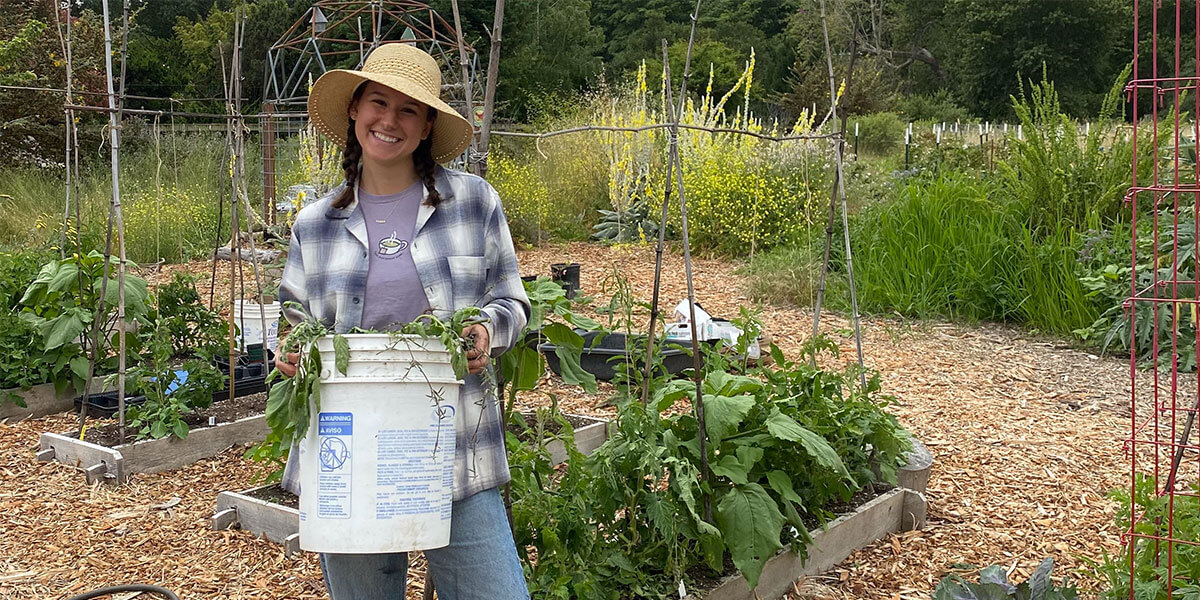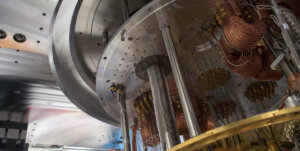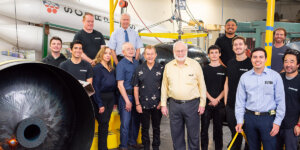
Natalia Ratner (BS ’25)
What inspired you to study engineering and to apply to USC in particular?
I’ve always been an intrinsically optimistic person, but I’m also part of a generation that came of age during worsening climate change, a global pandemic and intensifying wildfires. Studying engineering felt like a natural way to reconcile that tension – to turn hope into action and gain the skills to address challenges that feel both urgent and deeply personal.
Following in my brother’s footsteps (a proud Trojan himself), I had my heart set on USC from the start. I was drawn to the incredible research opportunities, as well as the unique combination of mountains, beaches and culture that Los Angeles offers. One thing that really stood out during the application process was USC Viterbi’s gender parity in engineering. On campus, I saw that it wasn’t just a statistic. It’s been a privilege to learn alongside so many intelligent, driven women and to be mentored by female professors leading groundbreaking work in their fields.
As you approach commencement, what do you consider to be some of your most significant academic achievements?
One achievement I’m especially proud of is receiving the David M. Wilson Award for Outstanding Academic Achievement in Environmental Engineering. It felt like the culmination of many late nights in the library, but also a reflection of the support and inspiration I found at USC Viterbi. Learning felt meaningful because our professors were not only passionate but also actively engaged in solving real-world problems – whether developing air pollution models, designing cutting-edge water treatment systems, or accelerating the decarbonization of the electricity grid. Their work brought our coursework to life and reminded me why I chose to study environmental engineering in the first place.
How have you applied your knowledge beyond academia?
As a freshman and sophomore, I served as the community liaison for USC’s Engineers Without Borders chapter. Our team designed a latrine system for a rural community in Malawi, and I coordinated communication between our group and local partners. It was incredibly fulfilling to apply what I was learning in class to a real-world project. I also realized that technical skills alone aren’t enough – successful projects depend just as much on listening to the community, respecting local values, and building trust.
Tell us about your gap year experience?
Between my sophomore and junior years, I took a gap year to live abroad and pursue a mix of volunteer work, internships and passion projects. I spent the summer in Israel, interning as a climate and sustainability consultant for Deloitte. Then I moved to India to live and teach at Shanti Bhavan, a rural school that educates children considered to be of the lowest caste and prepares them for top Indian and U.S. universities (fun fact: the school was 100% solar-powered, and all meals were sourced from a sustainable on-campus farm.) My time there helped me reflect on the privilege of a USC education and how I can pay it forward through service and community-focused work.
The following summer, I worked on a regenerative farm in Soquel, California, where I learned about sustainable agriculture practices like crop rotation, composting, and natural pest management – and spent plenty of time with baby goats! I returned to USC full of gratitude, insight, and inspiration from the people and global issues I encountered.
Who have you especially enjoyed working with at USC?
I’ve had the privilege of conducting research with Professor Kelly Sanders throughout my undergraduate studies. Her course, Energy Systems and Environmental Tradeoffs, sparked my interest in energy, climate, and sustainability, and led me to join her research group and pursue related internships. Our work included optimizing the placement of cooling centers during extreme heat events and analyzing emissions from the residential and utility sectors. Dr. Sanders has been an incredible mentor – her kindness, encouragement, and passion continue to inspire me. Watching her return from a role at the White House Office of Science and Technology Policy showed me how research can be translated into real-world impact.
That experience also motivated me to intern with the climate think tank RMI, where my manager was another fellow Trojan! At RMI, I developed a web scraper to track industrial decarbonization projects worldwide in sectors like steel, cement, and shipping. It was an opportunity to apply the technical skills and perspective I gained through research to support meaningful decarbonization efforts.
Based on what you know now, what is your best piece of advice for other students?
Say yes! Some of my most meaningful experiences at USC came from stepping outside my comfort zone. One of the best things about this university is the wide range of opportunities to explore – clubs, classes, and communities you might never have considered. During my time here, I tried triathlon club, sailing, improv, Greek life, rock climbing, and more before finding the spaces and people that felt like home. Say yes to new experiences and new people – even if you feel out of place at first. You’ll grow from all of it.
What’s next for you after graduation?
After graduation, I’ll be joining the Peace Corps for two years as a Water, Sanitation, and Hygiene (WASH) Facilitator in Peru. I’ll be working closely with communities to design and improve rural water systems while leading education initiatives about water use and the health impacts of environmental issues. I’m excited to apply the skills I’ve gained through my degree to support projects that create meaningful change in daily life and contribute to more resilient, healthier communities.
After returning from the Peace Corps, I plan to attend medical school. I want to build on the problem-solving mindset I developed through engineering while diving deeper into the environmental factors that influence human health.
Published on May 12th, 2025
Last updated on May 19th, 2025













